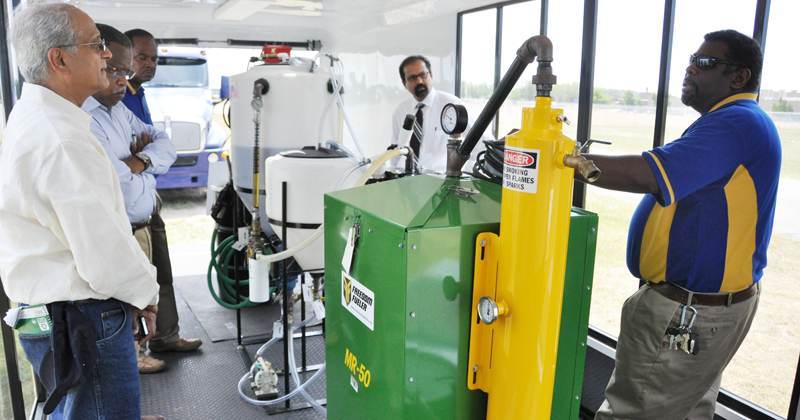The director of a government agency with ties to Fort Valley State University has been on the job only ten weeks, yet he visited the institution on July 26.
Dr. Sonny Ramaswamy's U.S. Department of Agriculture agency, National Institute of Food and Agriculture (NIFA), provides funding to land-grant institutions such as FVSU. He visited the campus to see firsthand what programs the university is offering. NIFA provides funding to educate young people, to help discover new knowledge and to create innovations that can solve problems affecting our communities, he said.
"The land-grant system touches, in America, every human being in every county," Ramaswamy said. "In every county, we've got Cooperative Extension Service, and the research outcomes and the education outcomes of the land-grant institutions are having an impact on those communities."
Fort Valley State receives NIFA funding to conduct research in the areas of food security, food safety and sustainable agriculture. The historically black university also gets money for a range of programs, including those that address: increasing agriculturalists of color by offering scholarships and summer programs to incoming freshmen; educating families about healthy living; and providing information related to estate planning and timber management for limited-resource landowners.
Driving from an Extension meeting in Savannah, Ramaswamy spent four hours meeting with administrators and department leaders, touring agricultural facilities and speaking to about 75 people in the Pettigrew Center.
"I was pretty impressed. Oh my gosh, I'm going to have to come back and dig deeper," he said. "It was very nice. The people have been fantastic."
He spent about 45 minutes answering questions, noting suggestions and addressing faculty, staff, administrators, farmers and local officials. Ramaswamy, an entomologist who was a dean at Oregon State University, gave an overview of his new role and his agency's purpose of supporting research initiatives that can help communities. He discussed the challenge of dealing with the increased population, which will affect poverty levels, food supply, energy, water, "clean" air and hunger. Last Halloween, there were seven billion people on earth, Ramaswamy said, and another billion are anticipated in 10 years.
"It is a problem that's going to be very, very difficult to deal with," he said. "We have to come to some grips on how we are going to deal with these challenges that we've got."
In the meantime, Dr. Govind Kannan, dean of FVSU's College of Agriculture, Family Sciences and Technology, is optimistic about cultivating a relationship with Ramaswamy and continuing to use funding wisely to perform the land-grant's mission of not only educating Fort Valley State's students and conducting research, but assisting the community.
"I am pleased Dr. Ramaswamy took time to visit our campus, which underscores the importance of the role we play in the region's agricultural growth and economy," Kannan said.

